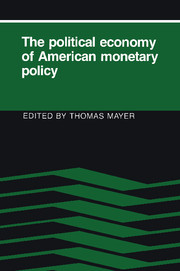Book contents
- Frontmatter
- Contents
- Preface
- List of contributors
- 1 Introduction
- 2 Studying the Fed: toward a broader public-choice perspective
- 3 The Federal Reserve reaction function: a specification search
- 4 Corporate profitability as a determinant of restrictive monetary policy: estimates for the postwar United States
- 5 Federal Reserve behavior since 1980: a financial-market perspective
- 6 The Federal Reserve and its institutional environment: a review
- 7 The political economy of monetary policy
- 8 Political monetary cycles
- 9 Congress and the Fed: why the dog does not bark in the night
- 10 The Federal Reserve as a political power
- 11 Monetary policy and political economy: the Federal Reserve and the Bank of Japan
- 12 A positive analysis of the policy-making process at the Federal Reserve
- 13 A theory of FOMC dissent voting with evidence from the time series
- 14 Explaining FOMC members' votes
- 15 Fed behavior and X-efficiency theory: toward a general framework
- 16 Minimizing regret: cognitive dissonance as an explanation of FOMC behavior
- 17 The discount window
- 18 Leaning against the wind: the behavior of the money stock in recession and recovery, 1953–8
- 19 Bureaucratic self-interest as an obstacle to monetary reform
- Index
2 - Studying the Fed: toward a broader public-choice perspective
Published online by Cambridge University Press: 06 July 2010
- Frontmatter
- Contents
- Preface
- List of contributors
- 1 Introduction
- 2 Studying the Fed: toward a broader public-choice perspective
- 3 The Federal Reserve reaction function: a specification search
- 4 Corporate profitability as a determinant of restrictive monetary policy: estimates for the postwar United States
- 5 Federal Reserve behavior since 1980: a financial-market perspective
- 6 The Federal Reserve and its institutional environment: a review
- 7 The political economy of monetary policy
- 8 Political monetary cycles
- 9 Congress and the Fed: why the dog does not bark in the night
- 10 The Federal Reserve as a political power
- 11 Monetary policy and political economy: the Federal Reserve and the Bank of Japan
- 12 A positive analysis of the policy-making process at the Federal Reserve
- 13 A theory of FOMC dissent voting with evidence from the time series
- 14 Explaining FOMC members' votes
- 15 Fed behavior and X-efficiency theory: toward a general framework
- 16 Minimizing regret: cognitive dissonance as an explanation of FOMC behavior
- 17 The discount window
- 18 Leaning against the wind: the behavior of the money stock in recession and recovery, 1953–8
- 19 Bureaucratic self-interest as an obstacle to monetary reform
- Index
Summary
Academic research on the behavior of the Federal Reserve System has accelerated rapidly in recent years. The spread of public-choice analysis has strongly challenged the traditional public-interest view of economic policy-making, opening up exciting new areas of research. In addition, the distinction between the effects of anticipated and unanticipated policy actions emphasized by rational-expectations theory has stimulated additional interest in estimating policy reaction functions. Likewise, the politics of economic policies, both domestic and international, has become a popular topic of research for political scientists. The small band of monetary economists who have long engaged in Fed-watching now has considerable company. This has been a very healthy development.
Monetary policy is determined by the interactions of the preferences and personalities of key government officials with formal and informal institutional structures and the pressures of interest groups and market behavior. This is a highly complex process, and as Tom Mayer emphasizes in his Introduction, its study requires institutional as well as formal mathematical and econometric analysis.
We can learn a great deal from the formal modeling of limited aspects of even very complex situations, but it is essential to keep in mind the distinction between the argument that a particular factor has significant explanatory power and the treatment of that factor as if it were the only important consideration. Both rational-expectations and public-choice theorists have at times failed to be clear on this, dismissing as irrelevant considerations that may have considerable explanatory power.
- Type
- Chapter
- Information
- The Political Economy of American Monetary Policy , pp. 13 - 26Publisher: Cambridge University PressPrint publication year: 1990
- 10
- Cited by

